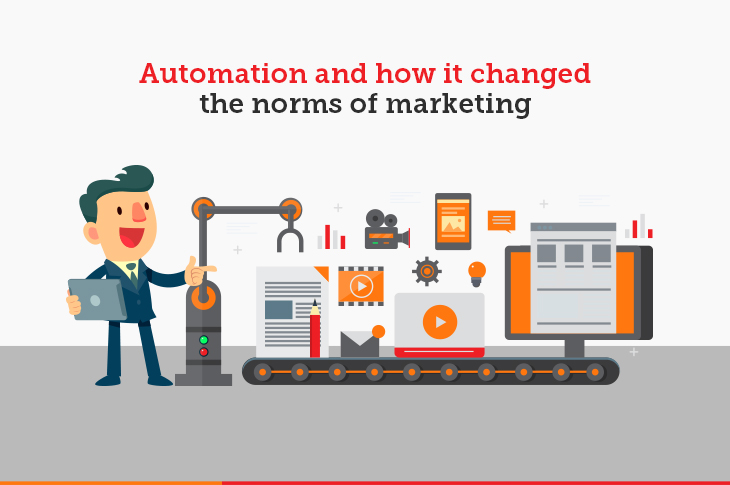How marketing automation is transforming customer experiences

The new normal has expedited the adoption of digital interactions and transactions among customers. With digital marketing attracting a substantial share of a marketer’s budget, marketing automation platforms have begun to attract centre stage. These platforms enable marketers to automate multiple and complex marketing campaigns as well as to measure their impact accurately and instantaneously. In fact, 91% of those who use marketing automation feel that it is one of the essential parts of online marketing. Let us understand how marketing automation is significantly influencing customer experiences and shaping new marketing norms:
Moving beyond emails
According to eMarketer, the median ROI delivered by email marketing has been an astonishing %. This is estimated to be four times that of any other digital marketing channel. Over the years, automation has played a vital role in enabling email marketers to nurture leads as well as drive sales by deploying the right message to the right audience at the right time using automated workflows.
However, emerging channels such as social media platforms and OTT are also delivering value through automation. have been around for a while. These tools have enabled marketers to schedule and run social media campaigns across platforms such as Facebook, Twitter and Linkedin. Examples of such tools include Hootsuite, Workflow and IFTTT. Thanks to these tools, marketers can streamline and automate various operational tasks. In the case of OTT platforms, marketers have discovered that behavioural patterns play a significant role in differentiating their most valuable subscribers from the rest of the users. For instance, marketers at one of the OTT platforms realised that subscriber value is directly impacted by mobile watching, favouriting content and the creation of watching lists. Using these insights, they were able to invest in automation by scheduling weekly campaigns. For example, multiple channels were used to run download app campaigns to target those who were viewing content from their mobile whereas in-app ads were used for nudging users to add movies into their watching list.
Data is usually captured through websites, landing pages, lead generation activities over multiple online marketing channels, existing customer databases and even offline campaigns which may have been done in the past. Yet, 60% of marketers struggle to deliver real-time personalised content. According to leading e-commerce solutions provider Monetate, believe that data within organisations remains untapped.
However, these challenges can be overcome by using specialised tools. Some of these platforms are adept at gathering customer data from multiple databases and monitoring important website metrics to create realtime, contextual, personalised campaigns. Other platforms analyse customer data to recommend intelligent predictions using machine learning which enable marketers to create a significantly personalised customer experience. There are even those tools that enable marketers to create customized user experiences for multiple user or customer segments. These segments can be tested to determine which factors influence user behaviour.
Driving customer gratification through bots
AI-powered chatbots have become indispensable for any business with an online presence. These chatbots respond to customer queries, resolve issues and even cross-sell products. A survey conducted by Econsultancy revealed that 57% of customers who preferred chatbots
organizations have been able to reduce customer frustration levels, engage in complex conversations and personalize customer journeys. According to a conducted by Capgemini, more than 75% of respondents agreed that their businesses have been immensely benefited by using chatbots. It has been estimated that by 2022, a substantial part of marketing and sales communications will occur between human users and chatbots.
Customer journeys aren’t linear. Hence, marketing automation means a lot more than “setting and forgetting” campaigns. Marketers can invest in building multiple customer journey scenarios. By mapping customer journeys in-depth, the needs and expectations of customers can be identified in a better manner. Suitable customer expectations can be set, relevant content can be crafted and appropriate marketing channels can be used. If this process is replicated across channels, refined business rules can be set up and the right messages can be delivered at the right time. Results can also be accurately tracked. Thus marketing automation can augment customer journeys across platforms and ameliorate customer experiences.
Thus, marketing automation has enabled marketers to derive greater value from their prospective and existing customers and is playing a key role in shaping current marketing norms.
Relevant Links:
https://optinmonster.com/email-marketing-vs-social-media-performance-2016-2019-statistics/
https://digitalmarketinginstitute.com/blog/the-impact-of-automation-on-digital-marketing-jobs
https://scatter.co.in/online-courses-to-upgrade-your-skills-if-you-are-a-writer-or-designer/
Contributors: Sudhakshina, Preeti Mishra and Swapnil Adsul
